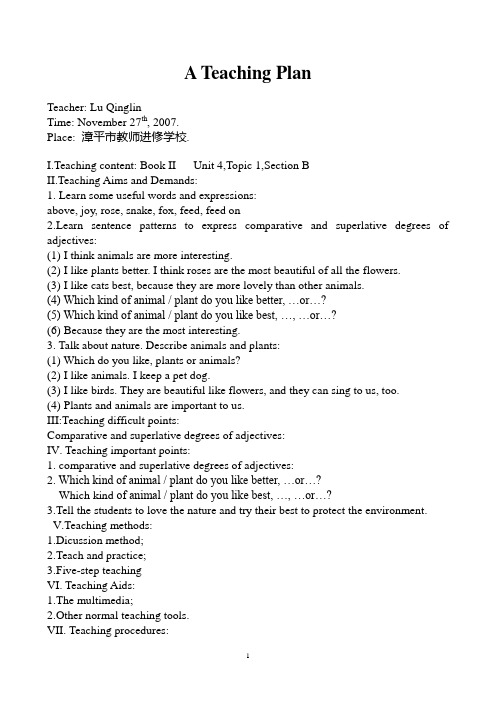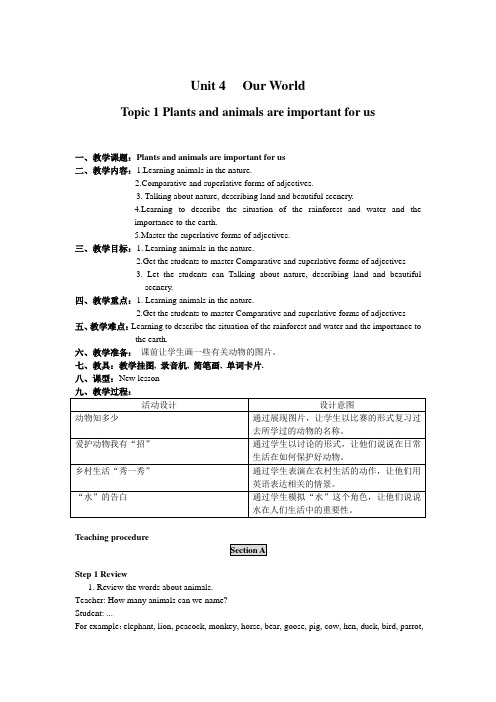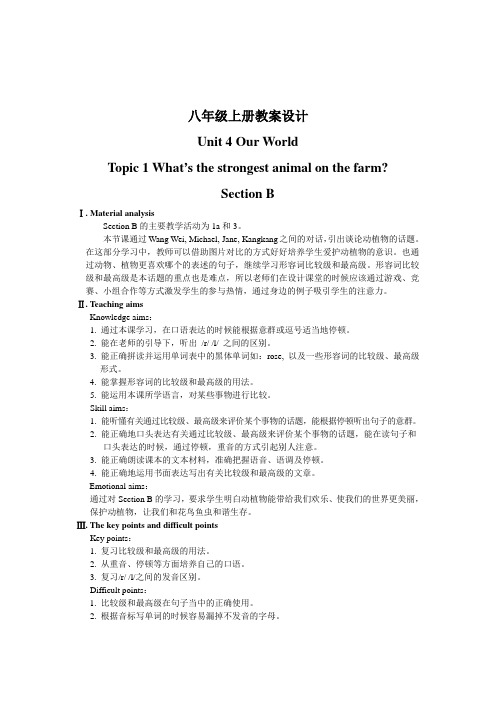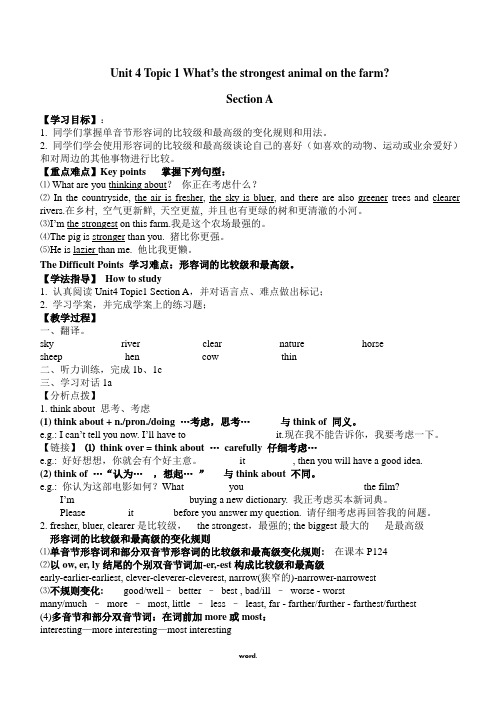八年级英语上册《Unit 4 Topic 1 SectionB》学案1
仁爱版8年级上 Unit 4 Topic 1 Section B导学案

仁爱版8年级上Unit 4 Topic 1 Section B导学案编制:杨振娟备课组长:杨振娟审核:连俊伟【学习目标】1.掌握page79的单词和短语。
2.自学理解1a的对话并熟背。
3.通过合作探究,熟练掌握和运用下列重点句型:1)Which do you like better, plants or animals?2)I think animals are more interesting.3)I think roses are the most beautiful of all the flowers.4)I like cats best because they are cuter than other animals.5)They give us joy.6)I like both plants and animals.4.全力以赴,高效达标,在合作探究中培养团队协作精神。
【自学指导】1、自学Page79的单词。
(根据音标拼读、拼写单词并牢记)。
2、预习SectionB1a,为课堂展示作准备。
3、标出重要的短语和句型,标出疑难点,准备课堂中讨论解决。
【自学检测】Ⅰ.用所给词的适当形式填空。
1) He is (talk) about the (photo)above with his friends.2) Which do you like (well), plants or animals?3) I think roses are (beautiful) of all the flowers.4) I like cats best because they are (cute) than other animals.5) Animals are our (friend).Ⅱ.英汉互译。
以…为食与…分享…take photos…两者都in the world play wit h…【合作探究】1.组内讨论解决自学引导中的疑难问题。
八年级英语上册Unit 4 Topic 1 Section B 导学案

Unit 4 Our World 英语(八上)导学案Topic 1 Plants and animals are important to us.设计人:罗德敏执教人:罗德敏Section B一、学习目标:1、学习多音节形容词比较级和最高级的变化规则及用法。
2、谈论自然界中的动植物,让学生初步了解它们之间的关系。
3、引导学生增强对大自然的热爱,提高他们保护动植物的意识。
二、学习重点、难点:1A重点:学习多音节形容词比较级和最高级的变化规则及用法。
难点:三、学法指导:自主学习法,小组讨论法,综合探究法。
四、学习过程:1、复习:(5分钟)(1)、复习上节课所学的形容词比较级和最高级的变化规则及用法。
(2)、复习本课单词。
掌握above, joy, rose, share…with…, snake, fox, frog, feed, feed on;理解insect, living。
2、综合探究法学习1a。
(12分钟)(1)、听读1a(多媒体教学课件),注意1a对话的语音语调。
(2)、跟读并教读1a,熟悉课文。
(3)、找出对话中的形容词比较级和最高级的句子并在书中划出来。
并写出形容词的比较级和最高级在下面的横线上。
interesting more interesting most interestingbeautiful more beautiful most beautiful比较以上两个形容词的比较级和最高级,有什么特点?得出结论多音节词和部分双音节词在词前加more和most。
(4)学习形容词比较级和最高级的其他用法。
(见课本P120)(5)、探究学习1a中的语法句子。
a. We share the same world with them. “share…with…”意为:与……分享……。
例子:I share the English book with my classmate.3、自主学习完成1b、1c。
仁爱版八年级上册英语优秀教学案例:Unit4Topic1SectionB教案

4.亮点四:全面多元评价关注学生成长,提高自我认知
教师设计具有针对性的评价指标,对学生进行全面、多元的评价,关注他们的综合素质。同时,教师引导学生相互评价,培养他们的评价能力和批判性思维。这种评价方式有助于学生发现自身的优点和不足,提高自我认知,激发学生的学习动力。
仁爱版八年级上册英语优秀教学案例:Unit4Topic1SectionB教案
一、案例背景
本案例背景以仁爱版八年级上册英语Unit4Topic1SectionB为例,本节课主要讨论了关于保护环境的重要性。通过本节课的学习,学生能够掌握日常生活中保护环境的基本方法,提高环保意识,并能够在实际生活中运用所学知识。此节课旨在培养学生的语言运用能力、合作意识和创新能力,使其在真实情境中运用所学知识解决实际问题。
在教学过程中,我将注重引导学生主动参与,积极思考,通过各种教学活动,使学生在轻松愉快的氛围中学习英语,提高综合素质。同时,我将关注每个学生的个体差异,给予他们充分的关爱和支持,帮助他们实现自己的潜能。
三、教学策略
(一)情景创设
1.利用多媒体展示环保问题图片,引导学生关注环境现状,激发学生保护环境的意识。
“How can we protect the environment?”,“We can recycle waste to save resources.”等。
3.教师通过环保案例,引导学生运用现在进行时态的被动语态,如“Waste is being recycled to protect the environment.”。
仁爱版英语八年级上册 Unit4 Topic1 SectionB 精品学案

Unit4 Topic1 SectionB 精品学案学习目标:1.学习多音节形容词比较级和最高级的变化规则及用法。
2.谈论自然界中的动植物,让学生初步了解它们之间的关系。
3.引导学生增强对大自然的热爱,提高他们保护动植物的意识。
课前预习:一、从文中找出下列短语。
更喜欢__________饲养宠物狗_____ _____ _____ ______使某人快乐____ ______ ______和某人玩耍____ ___ ____所有花中最好看的________________________唱歌给某人听______________众所周知____________对某人很重要____________________两者都__________和某人分享某物_______________________最喜欢____._______写出下列形容词的汉语及比较级和最高级:(1)interesting__________ ____________ ___________(2)beautiful__________ _____________ _____________(3)important __________ _____________ ________(4)friendly _________ ___________ __________(5)useful _________ ______________ ___________(6)clever ___________ __________ __________(8)lovely ____________ _____________ ________(9)cute _______ ______ _____(10) good _____ ______ ____二、语言点导学:1.I think roses are the nicest of all the flowers.译:_______________________在表示最高级的句子中,如果前后的名词是属同类的,则范围前用of;属不同类时用in。
八年级上英语unit4(SectionB 2a-2e)教学设计

Unit 4 What’s the best movie theater?Lesson Plan (Section B 2a-2e)I.Teaching objectivesA. Knowledge objectivesa) Students are able to identify words such as talent,common,beautifully,role,winner,prize,everybody,example,poor,seriously,give and so on.b) Students are able to understand reading material which contains new words and phrases in this unit.B. Ability objectivesa) Students are able to get main ideas.b) Students are able to improve reading skills.C. Moral objectivesStudents are able to try their best to be the best.II.Teaching important pointsa) New words and phrases such as talent show,have...in common,look for,and so on,all kinds of,be up to,play a role,make up,take...seriously,for example,come true and so on.b)Talk about talented shows.III. Teaching difficult pointsa) Sentence pattern: 1.It's always interesting to watch other people show their talents. 2.Talent shows are getting more and more popular.3.When people watch the show,they usually play a role in deciding the winner. 4.But if you don't take these shows too seriously,they are fun to watch.b) Ask others about talented shows.IV.Teaching aidsBlackboard, chalk, PPT, pictures.V.Teaching methodsCommunicative approach, Task-based teaching method.VI.Teaching proceduresStep1:Brainstorming1. List adverbs of frequency.go to the mountains, go to summer camp, go to the beach2. Finish 2a and check answer together.Step2: Work on 2b&2c1.Read the passage quickly and answer questions in 2c.2.Read the passage careful and write sentences in 2d.3.Check the answers together.4.Read passage again and finish 2e.5. Check answers together.6. Read passage together.VII.Homework1.Write and translate passage in 2b.。
八年级英语上册Unit4 Topic1 SectionB教学设计 最新仁爱版

Unit4Topic1SectionB教学设计Ⅰ.Material analysisSection B的主要教学活动为1a和3。
本节课通过Wang Wei,Michael,Jane,Kangkang之间的对话,引出谈论动植物的话题。
在这部分学习中,教师可以借助图片对比的方式好好培养学生爱护动植物的意识。
也通过动物、植物更喜欢哪个的表述的句子,继续学习形容词比较级和最高级。
形容词比较级和最高级是本话题的重点也是难点,所以老师们在设计课堂的时候应该通过游戏、竞赛、小组合作等方式激发学生的参与热情,通过身边的例子吸引学生的注意力。
Ⅱ.Teaching aims1.通过本课学习,在口语表达的时候能根据意群或逗号适当地停顿。
2.能在老师的引导下,听出/r//l/之间的区别。
3.能掌握形容词的比较级和最高级的用法。
4.能运用本课所学语言,对某些事物进行比较。
5.能正确朗读课本的文本材料,准确把握语音、语调及停顿。
6.能正确地运用书面表达写出有关比较级和最高级的文章。
Emotional aims:通过对Section B的学习,要求学生明白动植物能带给我们欢乐、使我们的世界更美丽,保护动植物,让我们和花鸟鱼虫和谐生存。
Ⅲ.The key points and difficult pointsKey points:1.复习比较级和最高级的用法。
2.从重音、停顿等方面培养自己的口语。
3.复习/r//l/之间的发音区别。
Difficult points:1.比较级和最高级在句子当中的正确使用。
2.根据音标写单词的时候容易漏掉不发音的字母。
Ⅳ.Learning strategies:比较级这一语法比较难,在学习的时候多想想自己和朋友的变化,试着多用英语夸夸同学的进步,不仅能增进感情,还能练习语法点。
Ⅴ.Teaching aidsComputer multimedia projector,pictures,cards with table Ⅵ.Teaching proceduresStep InteractionpatternStudent activity Teacher activityLead-in (5minutes)1.The wholeclass work2.The wholeclass workand individualwork1.Focus their attentionon the teacher.2.Students look at theBeautiful pictures happily.When they see the uglypicture,they may feel bad.All of the students like thebeautiful one.1.Greet students ready forlearning.2.Show2pictures tostudents.One isbeautiful.There aremany animals and flowers init.People play with their petshappily.The other one is veryugly,like pollution.Askstudents,“Which one do youlike better?”Lead-in (5minutes)3.The wholeclass work4.The wholeclass work5.Group work6.Individualwork3.Listen to the teacher.4.Students study thepronunciation andspelling of“rose”.5.Students answer thequestions withcomparative andsuperlative degrees.The answer may be“Ilike...better,because it iscute/beautiful...”6.Answer questions andreview comparativeand superlative degrees.cate students toprotect environmentto give the animals andflowers a nicer“home”.4.Show the4picturesof1a to students.Teachthe new word“rose”here.5.Ask students,“Whichdo you like better,plants or animals?Why?”6.Invite students to answerthis question.New words and sentences (10minutes)1.Individual work2.Individual work3.Individual work4.The wholeclass work1.Students listen to1a andwrite down the answers.They can hear“I like animalsbetter./I like plants better.”2.Listen to1a again andfinish1b.3.Students share theiranswers after theexamples.4.Read after the tapesentence by sentence.Marksome pause ifnecessary.Finish1a.1.Play1a.Show twoquestions to students,“Which does Michael likebetter,plants or animals?”“Which does Wang Wei likebetter,plants or animals?”2.Check the answersand play1a again.Askstudents to finish1b.3.Invite students toshare their answerswith a whole sentence.E.g.Wang Wei likesroses better.He thinksroses are the nicest ofall the flowers.New words and sentences (10minutes)5.Group work6.Individual workand groupwork7.Pair work5.Students read thepassage in groups.Groupleaders check whether all themembers can read thepassage and help those whocan’t read.6.Students read1acarefully and fill in theblanks.Students had betterfill in the blanks according totheir memories.7.Report the passage totheir partners.4.Play1a sentence bysentence.Ask studentsto pay attention to thepronunciation and thepause.5.Give students severalminutes to read thepassage.6.Show1c to students.Askstudents to read1acarefully and fill in theblanks.anize the students toshare the answers.Grammar (10minutes)1.The wholeclass workand groupwork2.Pair work3.Individualwork1.Each student shouldsurvey four students as quicklyas possible.They can use thesentences in1a.A:Which do you like better,plants or animals?B:I like...better.A:Why?B:Because it is the...In this part students shouldlearn the team work.2.Students put theirhands high.Make theconversations.3.Volunteers report theirresults like this:Jacklikes animals better,because he thinks animals arevery cute.Peter likes…best,because...Ann likes bothplants andanimals because...Finish2.1.Play a game.Whichgroup is the fastest?Hand out students a tablelike this:Name like reasonTell students the game rules:Each student shouldinterview four students.Students should do it quickly.If you finished,you can helpyour group members.Afterall of the group membersfinished,it is really finished.2.Invite students to practice theconversations.3.Invite students to report theresults they surveyedaccording to the table.Practice (10minutes)1.The wholeclass workand individualwork2.Individual work3.The wholeclass work4.The wholeclass workand individualwork5.Group workand individualwork6.Group workand individualwork7.Group work8.The wholeclass work9.The wholeclass work andindividual work1.Students spell the words2.Write down the wordsindividually.Pay attention tothe alphabet which isn’tpronounced in the words.3.Read and rememberthese words accordingto the pronunciation.4.Read these words afterthe tape.5.Read4a in groups.6.Read these words,paying attention to the keypoints.7.Read the sentences,paying attention to thepauses.8.Read after the tape,imitating thepronunciation and thepauses.9.Students listen to theStudent,and find out themistakes.1.Show the pictures in3tostudents and ask them tospell the words.2.Ask students to writedown the words individually3.Play3.Remind studentsTo check the vowels.4.Show4a to students.Play4a.Ask students to readafter the tape.5.Give students1minute toread4a.find some ways topronounce/r/and/l/well.6.Teacher teaches the keypoints when studentspronounce/r/and/l/.7.Show4b to students,encouraging them to readthe sentences in groups.8.Play4b and remindstudents,“You often pausewhen you see a comma orfinish a sense group.”9.Invite students to read inthe class.Summary (7minutes)1.The wholeclass workand groupwork2.The wholeclass work3.The wholeclass work4.The wholeclass work1.Students stand up quickly andpraise theirclassmates like this:I thinkLisa is taller than last year.Ithink John is more handsomethan before.I think Jordan isthe funniest in our class.2.At this time,students are veryhappy.Summarize the rulesof comparative andsuperlative degrees.3.Students read thesummaries.They can workin pairs to practice like adialogue.4.Students finish theirhomework after class.Review what theylearned before andpreview Section C.1.Play a game.Encouragestudents to praise theirclassmates with comparativeor superlative degrees.2.Give smiling faces tostudents and sum up:Ithink you are smarter thanlast year.Y ou are thecleverest students in theworld.3.Teacher sums up the keypoints:T:Which do youlike better,plants oranimals?S:I like...better.T:Why?S:Because they are cuterthan other animals.4.Homework:Take the table homewhich the teacher gavethem just now.Write apassage to introduce theirfriends’likes and reasons.Teaching ReflectionAfter this class,students can use comparative and superlative degrees easily.They can master the target language:Which do you like better,plants or animals?I like...better.Why?Because...However,there are many mistakes in grammar.If teacher designs more real situations for students to practice the grammar,it can be better.Ⅶ.Blackboard design。
仁爱版八年级上册英语教学设计:Unit4Topic1SectionB教案

1.创设情境,引入主题
利用图片、视频等资源,展示社会公益活动的场景,让学生对主题产生兴趣,激发他们的学习动机。
2.任务驱动,分层教学
设计不同难度的任务,针对不同水平的学生进行分层教学,让每个学生都能在任务中找到适合自己的学习内容。
3.听说训练,提高语言能力
通过听力练习、口语表达等形式,让学生在实际语境中运用所学知识,提高他们的听说能力。
4.教师布置课后作业,要求学生运用所学知识描述一个社会公益活动,并将作业在下一节课上进行展示。
五、作业布置
为了巩固本节课所学知识,培养学生的实践能力和社会责任感,特布置以下作业:
1.写一篇英语短文,描述一个你感兴趣的社会公益活动,如:志愿者服务、环境保护等。要求运用本节课所学的核心词汇和短语,以及一般现在时和一般过去时。字数在100-120词左右。
7.教学评价,关注成长
采用多元化评价方式,关注学生的成长过程,鼓励他们不断进步,增强自信心。
四、教学内容与过程
(一)导入新课
1.教师通过多媒体展示一组社会公益活动的图片,如志愿者服务、慈善筹款等,引导学生观察并思考这些活动的意义。
2.邀请学生分享他们对这些公益活动的了解和看法,激发学生的兴趣和参与热情。
(三)学生小组讨论
1.教师将学生分成小组,每组选择一个社会公益活动进行讨论,如:环境保护、关爱老人等。
2.各小组讨论如何参与这个活动,能为这个活动做些什么,以及如何向他人宣传这个活动。
3.学生在小组内部分工合作,用英语记录讨论内容,为课堂展示做好准备。
(四)课堂练习
1.教师设计一系列练习题,包括词汇填空、句子改写、听力选择等,帮助学生巩固所学知识。
2.与同学合作,制作一份关于社会公益活动的宣传海报。在海报中,用英语简要介绍活动目的、参与方式等,并配以相关的图片和图表。此作业旨在培养学生的团队协作能力和创造力。
仁爱八年级英语上册Unit 4,Topic 1,Section B教学设计

A Teaching PlanTeacher: Lu QinglinTime: November 27th, 2007.Place: 漳平市教师进修学校.I.Teaching content: Book II Unit 4,Topic 1,Section BII.Teaching Aims and Demands:1. Learn some useful words and expressions:above, joy, rose, snake, fox, feed, feed on2.Learn sentence patterns to express comparative and superlative degrees of adjectives:(1) I think animals are more interesting.(2) I like plants better. I think roses are the most beautiful of all the flowers.(3) I like cats best, because they are more lovely than other animals.(4) Which kind of animal / plant do you like better, …or…?(5) Which kind of animal / plant do you like best, …, …or…?(6) Because they are the most interesting.3. Talk about nature. Describe animals and plants:(1) Which do you like, plants or animals?(2) I like animals. I keep a pet dog.(3) I like birds. They are beautiful like flowers, and they can sing to us, too.(4) Plants and animals are important to us.III:Teaching difficult points:Comparative and superlative degrees of adjectives:IV. Teaching important points:1. comparative and superlative degrees of adjectives:2. Which kind of animal / plant do you like better, …or…?Which kind of animal / plant do you like best, …, …or…?3.Tell the students to love the nature and try their best to protect the environment. V.Teaching methods:1.Dicussion method;2.Teach and practice;3.Five-step teachingVI. Teaching Aids:1.The multimedia;2.Other normal teaching tools.VII. Teaching procedures:●课后反思:课堂练习一、根据句子意思填空,首字母已给出。
仁爱版八年级英语《Unit 4 Topic 1 Section B》导学案

仁爱版8年级上Unit 4 Topic 1 Section B导学案【学习目标】1.掌握page79的单词和短语。
2.自学理解1a的对话并熟背。
3.通过合作探究,熟练掌握和运用下列重点句型:1)Which do you like better, plants or animals?2)I think animals are more interesting.3)I like cats best because they are cuter than other animals.4)I like both plants and animals.【自学指导】1、自学Page79的单词。
(根据音标拼读、拼写单词并牢记)。
2、预习SectionB1a,为课堂展示作准备。
3、标出重要的短语和句型,标出疑难点,准备课堂中讨论解决。
【自学检测】Ⅰ.用所给词的适当形式填空。
1) He is (talk) about the (photo)above with his friends.2) Which do you like (well), plants or animals?3) I think roses are (beautiful) of all the flowers.4) I like cats best because they are (cute) than other animals.5) Animals are our (friend).结合课后注释及参考书预习本话题的要点知识,形容词的计较级和最高级。
形容词共分为三个等级:_____ ______ _______形容词的比较级用于______者之间的比较意为更……。
它的最高级用于_____者或____者以上的比较,意为最…….比较级和最高级的规则变化为:a ___________________________________________例如:long _______ ________strong ______ ______b___________________________________________例如:nice_______ _______fine_______ ________c___________________________________________例如:hot_______ _______big________ ________d___________________________________________例如:happy_______ _______healthy______ _______Ⅱ.英汉互译。
仁爱英语八年级上 Unit 4 topic 1 教案

Unit 4 Our WorldTopic 1 Plants and animals are important for us一、教学课题:Plants and animals are important for us二、教学内容:1.Learning animals in the nature.parative and superlative forms of adjectives.3. Talking about nature, describing land and beautiful scenery.4.Learning to describe the situation of the rainforest and water and theimportance to the earth.5.Master the superlative forms of adjectives.三、教学目标:1. Learning animals in the nature.2.Get the students to master Comparative and superlative forms of adjectives3. Let the students can Talking about nature, describing land and beautifulscenery.四、教学重点:1. Learning animals in the nature.2.Get the students to master Comparative and superlative forms of adjectives五、教学难点:Learning to describe the situation of the rainforest and water and the importance tothe earth.六、教学准备:课前让学生画一些有关动物的图片。
仁爱英语八年级上册Unit4Topic1SectionB教案

Unit 4 Our WorldTopic 1 Which do you like better, plants or animals?Section B(教学设计)黄歇中学童巧Ⅰ. 材料分析Section B的主要教学活动为1a和3。
之间的对话,引出谈论动植物的话题。
本节课通过Wang Wei, Michael, Jane, Kangkang之间的对话,引出谈论动植物的话题。
在这部分学习中,通过图片对比的方式可以培养学生爱护动植物,保护人类家园的意识。
也通过动物、植物更喜欢哪个的表述的句子,继续学习形容词比较级和最高级。
形容词比较级和最高级是本话题的重点也是难点,可以通过游戏、竞赛、小组合作等方式激发学生的参与热情。
Ⅱ. 教学目标(一)知识与技能目标:1.在口语表达的时候能根据意群或逗号适当地停顿,准确把握语音、语调及停顿。
2.能正确拼读并运用单词表中的黑体单词如:rose, 以及一些形容词的比较级、最高级形式。
3.能掌握形容词的比较级和最高级的用法,对某些事物进行比较。
4. 能正确地运用书面表达写出有关比较级和最高级的文章。
(二)过程与方法:1.通过图片,认知新单词2.通过听力训练,让学生在提取信息的同时更好地掌握比较级、更高级的形式3.通过对话与调查的形式,让学生学会表达对事物的评价4.通过游戏和写作训练,让学生进一步巩固用比较级、最高级来评价事物(三)情感态度与价值观:通过对Section B的学习,让学生明白动植物能带给我们欢乐、使我们的世界更美丽,保护动植物,让我们和花鸟鱼虫和谐生存,让我们的世界更美好。
Ⅲ. 教学重难点重点:1. 复习比较级和最高级的用法。
2. 从重音、停顿等方面培养自己的口语。
难点:1. 比较级和最高级在句子当中的正确使用。
2. 根据音标写单词的时候容易漏掉不发音的字母。
Ⅳ. 方法与策略:通过对话、调查的方式来练习比较级这一语法点;在比较事物的时候,感知世界的美好;赞扬同学的小游戏,不仅能增进感情,还能练习比较级。
2730.仁爱初中英语八上精品教案设计 Unit 4 Topic 1Section B

八年级上册教案设计Unit 4 Our WorldTopic 1 What’s the strongest animal on the farm?Section BⅠ. Material analysisSection B的主要教学活动为1a和3。
本节课通过Wang Wei, Michael, Jane, Kangkang之间的对话,引出谈论动植物的话题。
在这部分学习中,教师可以借助图片对比的方式好好培养学生爱护动植物的意识。
也通过动物、植物更喜欢哪个的表述的句子,继续学习形容词比较级和最高级。
形容词比较级和最高级是本话题的重点也是难点,所以老师们在设计课堂的时候应该通过游戏、竞赛、小组合作等方式激发学生的参与热情,通过身边的例子吸引学生的注意力。
Ⅱ. Teaching aimsKnowledge aims:1. 通过本课学习,在口语表达的时候能根据意群或逗号适当地停顿。
2. 能在老师的引导下,听出/r/ /l/ 之间的区别。
3. 能正确拼读并运用单词表中的黑体单词如:rose, 以及一些形容词的比较级、最高级形式。
4. 能掌握形容词的比较级和最高级的用法。
5. 能运用本课所学语言,对某些事物进行比较。
Skill aims:1. 能听懂有关通过比较级、最高级来评价某个事物的话题,能根据停顿听出句子的意群。
2. 能正确地口头表达有关通过比较级、最高级来评价某个事物的话题,能在读句子和口头表达的时候,通过停顿,重音的方式引起别人注意。
3. 能正确朗读课本的文本材料,准确把握语音、语调及停顿。
4. 能正确地运用书面表达写出有关比较级和最高级的文章。
Emotional aims:通过对Section B的学习,要求学生明白动植物能带给我们欢乐、使我们的世界更美丽,保护动植物,让我们和花鸟鱼虫和谐生存。
Ⅲ. The key points and difficult pointsKey points:1. 复习比较级和最高级的用法。
Unit4Topic1SectionB学案初中英语八年级上册

Unit 4 Topic 1 Section B【学习目标】1.能运用形容词的比较级和最高级来表达对动物和植物的喜爱。
2.能听懂有关通过比较级和最高级来评价某个事物的话题,并能根据停顿听出句子的意群。
3.能正确地口头表达有关通过比较级和最高级来评价某个事物的话题;能在读句子和口头表达的时候,通过停顿、重音的方式引起别人注意,并正确地使用比较级和最高级表达自己的观点。
【预习导学】一、填一填1.talk about2.make sb.happy3.play with...4.sing to...5.be important to...6.share...with...7.both... and...二、写一写写出形容词的比较级和最高级形式。
1.cute2.beautiful3.welleful5.clear6.nice三、译一译1.你更喜欢什么,植物还是动物?______________________________________________________________2.我认为动物更友好。
______________________________________________________________ 3.我认为玫瑰是所有花中最漂亮的。
______________________________________________________________ 4.植物和动物我都喜欢。
______________________________________________________________四、想一想1.Which do you like better, plants or animals?Why?______________________________________________________________ 2.What animals/plants do you like best? Why?______________________________________________________________【答案】一1.谈论2.使某人开心3.和……玩4.给……唱歌5.对……重要6.和……分享……7.既……又……二1.cuter cutest2.more beautiful most beautiful3.better best4.more useful most useful5.clearer clearest6.nicer nicest三1.Which do you like better, plants or animals?2.I think animals are friendlier.3.I think roses are the nicest of all the flowers.4.I like both plants and animals.四1.I like plants better because they make our world more beautiful / they give us food and fruit.I like animals better because they are cute / they are our friends.2.I like elephants best because they are strong.【合作探究】任务驱动一听说训练1.Listen to 1a and mark True(T) or False(F).◎Wang Wei is talking about his favorite photos with his family.( )◎Michael doesn't like animals at all.( )◎Michael thinks roses are the nicest of all the flowers.( ) ◎Kangkang thinks both plants and animals are important to people.( )◎Kangkang thinks people should share the same world with plants and animals.( ) 2.Listen again and plete the table.Names Likes Reasons(原因)Wang Wei They are of all the flowers.Michael They are .Maria They are and they can sing to us.Jane They are than other animals.3.Report the passage in the class.Wang Wei likes better and he thinks the roses are the of all the flowers.Michael likes better because he thinks they're .They makes us happy.Jane likes best because they are than other animals.Marialikes , because they are and they can sing to us.Kangkang likes both and because they are both to us.We the same world with them.任务驱动二自主学习Read 1a and answer the following questions.1.Which does Michael like better, plants or animals? Why?2.Which does Wang Wei like better, plants or animals?3.Why does Kangkang like both plants and animals?4.What does Michael, Wang Wei, Maria and Jane like? Why?任务驱动三小组活动1.对话练习根据所给的对话结构,与搭档通过问答的形式,练习对话。
人教版八年级上Unit4SectionB(1a1e)优秀教学案例

(三)学生小组讨论
1.教师布置讨论任务,让学生以小组为单位,运用过去进行时描述一组人物的活动。
2.学生在小组内进行讨论,共同创造语境,练习和运用过去进行时。
3.教师观察学生的讨论过程,及时进行指导和鼓励,确保学生能够积极参与。
3.鼓励学生互相评价、互相帮助,培养他们的团队协作能力和批判性思维。
4.教师对小组合作过程进行观察和指导,确保学生能够有效地进行学习和交流。
(四)反思与评价
1.教师引导学生进行自我反思,使他们能够认识到自己在学习过去进行时中的优点和不足。
2.组织学生进行同伴评价,让他们在评价中互相学习、互相成长。
3.教师对学生的学习过程和成果进行评价,关注他们的进步,激发他们的学习动力。
4.组织学生进行小组合作学习,鼓励他们互相交流、分享心得,提高他们的合作意识和团队精神。
(三)情感态度与价值观
1.培养学生对英语学习的兴趣,使他们能够积极、主动地参与课堂活动,体验学习英语的快乐。
2.培养学生热爱生活、关注他人的情感态度,使他们懂得关心他人,善于发现生活中的美好。
3.通过对两个孩子的一天的学习,培养学生珍惜时间、合理安排生活的价值观。
4.各小组展示讨论成果,教师进行评价和反馈,强调过去进行时的运用要点。
(四)总结归纳
1.教师引导学生总结过去进行时的构成、用法和时间状语,加深他们对过去进行时的理解。
2.学生通过总结归纳,巩固所学知识,提高他们的归纳和概括能力。
3.教师对过去进行时的知识点进行梳理和概括,为学生提供清晰的学习框架。
(五)作业小结
(二)过程与方法
1.采用任务型教学法,引导学生参与各种真实的语言活动,如角色扮演、小组讨论等,让学生在实践中感知、理解和运用过去进行时。
内蒙古乌拉特中旗一中八年级英语上册《Unit 4 Topic 1 SectionB》学案1(无答案) 人教新目标版

内蒙古乌拉特中旗一中八年级英语上册《Unit 4 Topic 1 SectionB》学案1 人教新目标版短语(读课文找短语)(1) 与---共有(2)以---为食(3) 陪你玩(4) 两者都(5)据我所知(6)今后(7)分享同一个世界【课内探究】『自主学习』快速阅读对话并解答下列问题。
1.老虎比狐狸更危险。
(翻译)2.曹老师在所有老师中是最受欢迎的。
(翻译)『拓展』英语中,多音节形容词及部分双音节形容词在其前面加上more和most 构成其比较级和最高级。
还有两大类动词转化成的形容词也在其前面加more 构成比较级,加most 构成最高级:一类是v.-ing 型的形容词,另一类是v.-ed型的形容词。
常见的这类词有:_______________________________________________________________________________________________________ ____________________________________________________________________________ ____________________________________________________________________『小组讨论』听录音完成练习1b。
『互动学习』再读短文并完成1c.『自主学习』看图完成食物链并填空。
【自我检测】Ⅰ、选词填空。
above, rose, snake, joy, plant1.She likes cats, because they give her a lot of _____.2.---Many people are afraid of _____. ---That’s right.3.---Which is the best season to _____ trees?---I think it’s spring.4. Read the dialog _____ and answer the following questions.5. ---Most girls like red _____ a lot. ---I agree with you.Ⅱ、根据汉语意思完成下列英语句子。
秋季仁爱版英语八年级上册Unit-4-Topic-1导学案#精选.

Unit 4 Topic 1 What’s the strongest animal on the farm?Section A【学习目标】:1. 同学们掌握单音节形容词的比较级和最高级的变化规则和用法。
2. 同学们学会使用形容词的比较级和最高级谈论自己的喜好(如喜欢的动物、运动或业余爱好)和对周边的其他事物进行比较。
【重点难点】Key points 掌握下列句型:⑴ What are you thinking about?你正在考虑什么?⑵In the countryside, the air is fresher, the sky is bluer, and there are also greener trees and clearer rivers.在乡村, 空气更新鲜, 天空更蓝, 并且也有更绿的树和更清澈的小河。
⑶I’m the strongest on this farm.我是这个农场最强的。
⑷The pig is stronger than you. 猪比你更强。
⑸He is lazier than me. 他比我更懒。
The Difficult Points 学习难点:形容词的比较级和最高级。
【学法指导】How to study1. 认真阅读Unit4 Topic1 Section A,并对语言点、难点做出标记;2. 学习学案,并完成学案上的练习题;【教学过程】一、翻译。
sky _________ river __________ clear ________ nature _________ horse _________ sheep _________ hen __________ cow _________ thin ___________二、听力训练,完成1b、1c三、学习对话1a【分析点拨】1. think about 思考、考虑(1) think about + n./pron./doing …考虑,思考…与think of 同义。
Unit4Topic1SectionB(2)(仁爱版八年级英语上册教案教学设计)

Unit4Topic1SectionB(2)(仁爱版八年级英语上册教案教学设计)课型:新授课设计:谭莉审核八年级英语教师审批:学习目标:1词汇:snake, fox, insect, frog, living, feed, feed…on2. 复习巩固形容词的比较级和最高级学习重点:目标1. 2学习疑点:比较级和最高级的运用学习方法:自主学习,合作探究课前准备翻译下列单词或短语、句型:1、蛇________2、狐狸________3、青蛙________4、饲养____________5、以….为食__________6、生物______________7、在将来我们的世界会怎样?______________________知识点链接Insects feed on plants.昆虫吃植物。
feed on… 以。
为食。
Eg:我们吃大米。
We feed on rice.feed …to:把。
喂给,向。
供给食料eg; 我拿肉喂我的狗。
I feed meat to my dog.feed…with向。
提供,用。
满足eg:她喂婴儿牛奶。
She feeds the baby with milk.教学步骤:1. 展示课前准备。
2、目标展示,学法指导。
3、复习形容词比较等级,3.看图填空P。
80.part24、学生展示5.展示1b,6、听录音检查答案巩固提高一.词形转化1.with _____________(反义词)________(主格)3.danger____________(形容词)4.well_______(最高级)5.fox______________(复数)6.popular___________(比较级)7.lie_____________(现在分词) 8.good__________ (副词)9. live___________(形容词) 10.eat___________(过去式)二、按要求句型转换1.This movie is interesting and that one is more interesting.(改为同义句)This movie is_______ ________ _________ that one.2.I prefer plants to animals. (改为同义句)I________ plants_______ _______ animals.3.Fang Fang is the tallest girl in her class. (改为同义句)Fang Fang is _____ than_____ _______ ______ in her class.4. I like birds because they are beautiful like flowers.(提问)_______ ______ you like birds?5.My grandfather lives in the countryside.(用in the city改为选择疑问句)Where_____ your grandfather______, in the countryside ___ In the city.课后反思Unit 4,Topic 1, Section C(1A-1C)设计:谭莉审核:审批:学习目标:1.学会单词cover, earth, surface, dark, thousand, dark, forest, control, climate, wood, rubber, protect, main2. 复习形容词的比较级和最高级。
- 1、下载文档前请自行甄别文档内容的完整性,平台不提供额外的编辑、内容补充、找答案等附加服务。
- 2、"仅部分预览"的文档,不可在线预览部分如存在完整性等问题,可反馈申请退款(可完整预览的文档不适用该条件!)。
- 3、如文档侵犯您的权益,请联系客服反馈,我们会尽快为您处理(人工客服工作时间:9:00-18:30)。
八年级英语上册《Unit 4 Topic 1 SectionB》学案1 人教新目标
版
短语(读课文找短语)
(1) 与---共有
(2)以---为食
(3) 陪你玩
(4) 两者都
(5)据我所知
(6)今后
(7)分享同一个世界
【课内探究】
『自主学习』快速阅读对话并解答下列问题。
1.老虎比狐狸更危险。
(翻译)
2.曹老师在所有老师中是最受欢迎的。
(翻译)
『拓展』英语中,多音节形容词及部分双音节形容词在其前面加上more和most 构成其比较级和最高级。
还有两大类动词转化成的形容词也在其前面加more 构成比较级,加most 构成最高级:一类是v.-ing 型的形容词,另一类是v.-ed型的形容词。
常见的这类词有:___________________________
____________________________________________________________________________ ____________________________________________________________________________ ____________________________________________________________________
『小组讨论』听录音完成练习1b。
『互动学习』再读短文并完成1c.
『自主学习』看图完成食物链并填空。
【自我检测】Ⅰ、选词填空。
above, rose, snake, joy, plant
1.She likes cats, because they give her a lot of _____.
2.---Many people are afraid of _____. ---That’s right.
3.---Which is the best season to _____ trees?
---I think it’s spring.
4. Read the dialog _____ and answer the following questions.
5. ---Most girls like red _____ a lot. ---I agree with you.
Ⅱ、根据汉语意思完成下列英语句子。
1. ---你喜欢哪种动物? ---狮子。
---Which _____ _____ animal do you like? ---Lions.
2.众所周知,所有的生物都很重要。
_____ _____ _____, all the living things are very important.
3.我们将来的生活会是什么样呢
What will our life _____ _____ in the future?
4.---你愿意给我们唱首歌吗? ---我很乐意,但我不会。
---Would you like to _____ _____ us? ---I’d love to, but I can’t sing.
5.汤姆,你比以前更粗心大意了。
You are _____ _____ _____ before, Tom.
【布置作业】
1.背诵1A ,
2.79、80页单词3/
3.
3.1A课文抄写加翻译。
4.完成练习册、学案。
【小结】。
